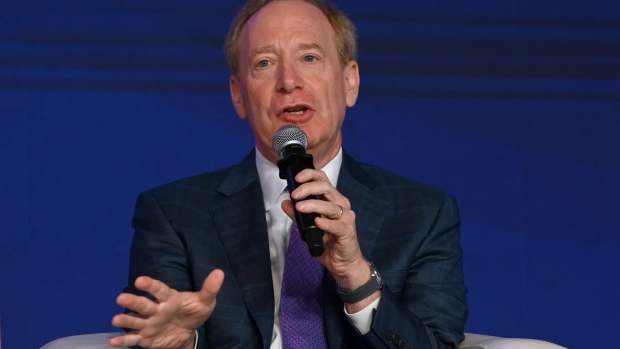Mar 8, 2024
Microsoft Game Testers Boost Union Ranks at Company to 1,000
, Bloomberg News

(Bloomberg) -- About 600 video game testers at Microsoft Corp.’s Activision Blizzard studios have unionized, more than doubling the size of labor’s foothold at the software giant, according to the Communications Workers of America.
The achievement, which brings the unionized workforce within Microsoft to roughly 1,000, was possible partly thanks to Microsoft’s labor-friendly posture. Unlike most US tech giants, the company declined to campaign against organizing efforts and agreed to voluntarily recognize and negotiate with the group if it secured majority support.
On Friday, an arbitrator overseeing an election determined that 390 of the nearly 600 workers supported the union, according to CWA, while only eight voted against it. The others in the new bargaining unit didn’t participate.
Microsoft confirmed that it will negotiate with the newly unionized group. “We look forward to continuing our positive labor management relationship,” Amy Pannoni, Microsoft vice president and deputy general counsel, said in a statement.
The employees, who provide quality assurance, are based in California, Texas and Minnesota. By organizing, they hope to improve their pay, benefits and job security, and get a say in the company’s decision-making.
“There’s been a lot of decisions that were made higher up that we’re just not a part of,” said QA tester Andrew Snell, a member of the union’s organizing committee. “We’re just ready to go, ‘Hey, maybe it’s time for us to step in as well and help steer the ship.’”
The latest union victory at Activision, acquired by Microsoft last year, could provide a boost for CWA’s efforts to organize gaming workers at other companies. It also could help the union make inroads among better-paid workers elsewhere at Microsoft, who may prove harder to organize.
CWA previously organized roughly 400 quality assurance workers at Activision and the Microsoft game publisher ZeniMax. The union has also secured union recognition in recent years among New York Times Co. tech workers, Oklahoma City Apple Inc. store employees and staff at a handful of Wells Fargo & Co. branches.
Microsoft has been unusually open to working with unions. As it sought regulatory approval in 2022 to buy Activision, the company announced a new set of principles, including a commitment to “collaborative approaches that will make it simpler” for workers to choose whether to unionize.
The software giant also entered an agreement with CWA on more specific terms that would make it easier to unionize certain roles and, when ZeniMax game testers sought to unionize, stayed neutral rather than opposing their efforts. Last December, the company announced it would take a similar approach to organizing campaigns by other AFL-CIO unions.
In contract talks underway at ZeniMax, Microsoft has agreed to language governing how it deploys artificial intelligence and committed to convert a group of staff from subcontracted temps to unionized, higher-paid Microsoft employees.
“I think we all have to look to the future and acknowledge that artificial intelligence is going to change many people’s jobs,” Microsoft President Brad Smith said at an event in December with the AFL-CIO, where they announced a partnership aimed at understanding how AI will affect workers. “This is a bridge between great union organizations and a technology company. I think with this foundation and mutual respect, we can do more to address the issues AI will inevitably raise. There will be hard days, but this is essential for the future,” Smith said.
Under US law, companies have the option to voluntarily recognize and negotiate with a union as soon as it signs up a majority of employees, or to instead hold out for an election conducted by the US National Labor Relations Board. Such NLRB elections can be contentious, with companies holding mandatory anti-union meetings for employees and unions exerting public pressure against union-busting.
Microsoft’s approach has contrasted starkly with its Seattle-area neighbors Starbucks Corp. and Amazon.com Inc. Both have waged yearslong disputes with unions organizing their employees, and been accused by NLRB prosecutors of repeatedly violating workers’ rights. The companies have denied wrongdoing.
Last week, Starbucks signaled it was moving in Microsoft’s direction, announcing a commitment to work with Starbucks Workers United to end hostilities and hash out a fair process for workers to organize.
--With assistance from Jackie Davalos and Dina Bass.
(Updates with Microsoft comment in fourth paragraph.)
©2024 Bloomberg L.P.





